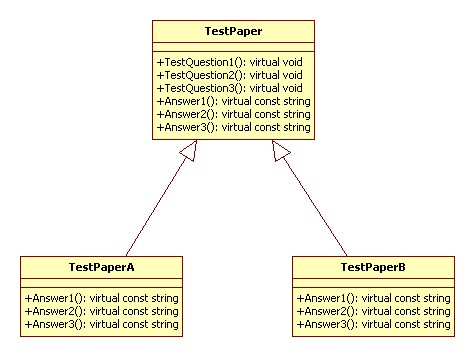来自于《大话设计模式》
模板方法模式:定义一个操作中的算法的骨架,而将一些步骤延迟到子类中。模板方法使得子类可以不改变一个算法的结构即可重定义该算法的某些特定步骤。
尽量将公共操作上移到基类中,这样便于修改,代码复用性更强。
UML 类图:

代码实现 C++:
1 #include <iostream>
2 #include <string>
3 using namespace std;
4
5 class TestPaper
6 {
7 public:
8 virtual void TestQuestion1()
9 {
10 cout << "TestQuestion1" << endl;
11 cout << "Answer: " << Answer1() << endl;
12 }
13 virtual void TestQuestion2()
14 {
15 cout << "TestQuestion2" << endl;
16 cout << "Answer: " << Answer2() << endl;
17 }
18 virtual void TestQuestion3()
19 {
20 cout << "TestQuestion3" << endl;
21 cout << "answer: " << Answer3() << endl;
22 }
23 virtual const string Answer1() = 0
24 {
25 return "";
26 }
27 virtual const string Answer2() = 0
28 {
29 return "";
30 }
31 virtual const string Answer3() = 0
32 {
33 return "";
34 }
35 };
36
37 class TestPaperA : public TestPaper
38 {
39 public:
40 virtual const string Answer1()
41 {
42 return "a";
43 }
44 virtual const string Answer2()
45 {
46 return "b";
47 }
48 virtual const string Answer3()
49 {
50 return "c";
51 }
52 };
53
54 class TestPaperB : public TestPaper
55 {
56 public:
57 virtual const string Answer1()
58 {
59 return "c";
60 }
61 virtual const string Answer2()
62 {
63 return "b";
64 }
65 virtual const string Answer3()
66 {
67 return "a";
68 }
69 };
70
71 int main()
72 {
73 TestPaperA a;
74 a.TestQuestion1();
75 a.TestQuestion2();
76 a.TestQuestion3();
77
78 TestPaperB b;
79 b.TestQuestion1();
80 b.TestQuestion2();
81 b.TestQuestion3();
82
83 TestPaper* p;
84 p = new TestPaperA;
85 p->TestQuestion1();
86 p->TestQuestion2();
87 p->TestQuestion3();
88 delete p;
89
90 p = new TestPaperB;
91 p->TestQuestion1();
92 p->TestQuestion2();
93 p->TestQuestion3();
94 delete p;
95
96 return 0;
97 }
posted on 2011-04-25 16:41
unixfy 阅读(168)
评论(0) 编辑 收藏 引用